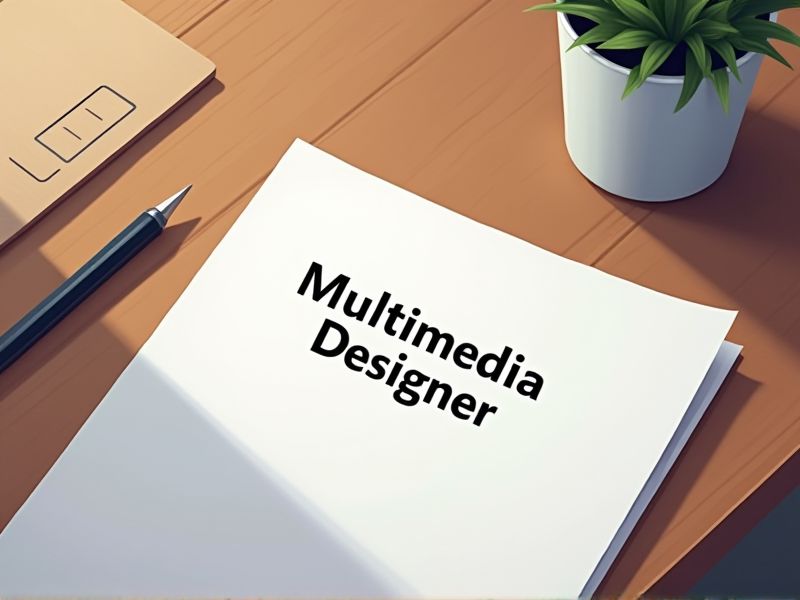
Multimedia Design is a dynamic field that requires a blend of creativity and technical skills to produce engaging content. Without certain certifications, a designer may struggle to navigate complex software and industry standards. Certifications not only validate a designer's proficiency in critical tools like Adobe Creative Suite but also enhance their employment prospects and credibility. Below are some key certifications essential for a Multimedia Designer.
Adobe Certified Expert (ACE) - Photoshop
Achieving the Adobe Certified Expert (ACE) in Photoshop demonstrates mastery of powerful design tools essential for multimedia projects. This certification can enhance a multimedia designer's credibility, potentially leading to more job opportunities and higher rates. Mastery of Photoshop ensures efficiency and precision in editing workflows, optimizing project timelines. Validating skills through ACE designation often boosts a designer's confidence in tackling diverse and complex design challenges.
Adobe Certified Expert (ACE) - Illustrator
Having an Adobe Certified Expert (ACE) certification in Illustrator demonstrates a multimedia designer's proficiency with the software, leading to enhanced job opportunities. Employers often prioritize certified individuals, as they can confidently handle complex design tasks, ensuring quality and efficiency. The certification indicates a professional's commitment to staying updated with industry standards, crucial in the fast-evolving multimedia field. A recognized credential like ACE can also lead to increased trust from clients, potentially resulting in more freelance work and projects.
Adobe Certified Expert (ACE) - InDesign
The Adobe Certified Expert (ACE) credential in InDesign validates proficiency, ensuring a multimedia designer can efficiently create and manage design layouts. This certification helps designers stay competitive by demonstrating up-to-date skills with industry-standard tools. Mastery of InDesign enables seamless integration of text, images, and graphics, essential for multimedia projects. Clients and employers gain confidence in a designer's ability to deliver professional-quality work, increasing job opportunities.
Adobe Certified Expert (ACE) - After Effects
Achieving the Adobe Certified Expert (ACE) - After Effects designation boosts a multimedia designer's credibility, making them more appealing to potential employers. This certification confirms a designer's proficiency in using After Effects, leading to increased efficiency and creativity in projects. Companies often seek certified individuals to confidently ensure that projects are delivered with high quality and technical accuracy. As digital media continues to grow, certified professionals tend to stand out in a competitive job market, leading to more job opportunities and potential salary increases.
Adobe Certified Expert (ACE) - Premiere Pro
Earning the Adobe Certified Expert (ACE) - Premiere Pro certification enhances a multimedia designer's credibility, signaling proficiency in industry-standard video editing software. This certification enables designers to execute projects more efficiently, which can improve client satisfaction and project completion times. Possessing the ACE designation often increases a designer's marketability, opening up more job opportunities and potential for higher earnings. Staying updated with certification requirements ensures that designers remain knowledgeable about the latest software features and trends, keeping their skills relevant.
Apple Certified Pro - Final Cut Pro X
Being an Apple Certified Pro in Final Cut Pro X enhances a multimedia designer's credibility and marketability in the industry. Mastery of this software ensures efficient and high-quality video editing, which leads to improved project outcomes. The certification provides a comprehensive understanding of advanced editing techniques, allowing designers to tackle complex projects with confidence. Employers often seek certified professionals to reduce onboarding time and ensure proficiency in industry-standard tools.
Autodesk Certified Professional - 3ds Max
Obtaining the Autodesk Certified Professional in 3ds Max enhances a multimedia designer's credibility, indicating proficiency in complex 3D modeling and rendering. Mastery of 3ds Max tools can improve the quality and realism of multimedia projects, which often require intricate design elements. The certification demonstrates a commitment to staying updated with industry-standard technology, important for keeping designs relevant. It also enables better job prospects and client trust, as employers and clients typically seek verifiable qualifications in multimedia design.
Unity Certified 3D Artist
Hiring a Unity Certified 3D Artist ensures multimedia projects are developed with technical proficiency and industry standards. Certification signifies advanced expertise in 3D modeling, enhancing project aesthetics and user experience. Their skills efficiently simplify complex design challenges, resulting in reduced project timelines and costs. A certified artist also brings the latest trends and techniques, strengthening a multimedia designer's competitive advantage.
Google UX Design Professional Certificate
The Google UX Design Professional Certificate equips a multimedia designer with a comprehensive understanding of user-centered design, enhancing their ability to create intuitive interfaces. By acquiring skills in wireframing and prototyping, designers can effectively communicate their design ideas to stakeholders and developers. This certification provides a solid foundation in design research, enabling multimedia designers to craft content that aligns with user needs and preferences. Completing this program adds credibility and distinction to a designer's portfolio, making them more competitive in the industry.
Certified Digital Media Designer (CDMD)
A Certified Digital Media Designer (CDMD) ensures multimedia designers stay updated with evolving technologies and industry standards. Certification provides a benchmark of skill, enhancing a designer's credibility in a competitive market. It signals to employers a commitment to professional growth and adherence to best practices. Certified designers often bring a deeper understanding of digital trends, leading to more innovative and effective multimedia solutions.
Summary
When you pursue certifications as a Multimedia Designer, you likely enhance your professional credibility. This additional qualification can make your portfolio more attractive to potential employers or clients, increasing job opportunities. The certification process typically updates your skills with current industry standards. Finally, these credentials might lead to higher earning potential and career advancement.
